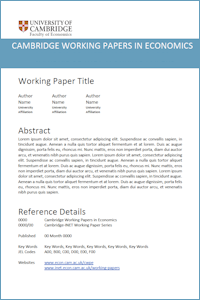
Noort, S.
The Importance of E ective States: State Capacity and Economic Development
CWPE1821
Abstract: Political scientists have long suspected that differences in the degree to which governments are able to effectively implement and enforce public policy (i.e. state capacity) are at the root of economic (under)development. Measurement error and endogeneity have, however, prevented researchers from obtaining a credible estimate of the effect of state capacity on economic performance. Using an improved measure of state capacity and exposure to 1700-1788 inter-state warfare as an instrument, I find that state capacity alone is able to explain 57% of all cross-country differences in GDP per capita and that its effect is larger than other prominent explanations for cross-country differences in economic development, such as: constraints on the executive, democracy, latitude, landlockedness, social capital, natural resources, legal origins, ethnic fractionalization, and others. Using mediation analysis I find that state capacity affects economic development through factors that enable markets to allocate resources more efficiently (law and order), and through better performance in sectors where market failures are prone to arise (education, infrastructure, and technology). I find that these results are robust to more than 100 controls and show empirically that the IV estimates are robust to relatively large violations of the exclusion restriction. I also find that state capacity explains a significant fraction of cross-country growth rates over the 1950 to 2010 period.
Keywords: Institutions, Economic Development, State Capacity, Private Property Rights, Human Capital Accumulation, Public Goods, Law and Order, Technology
Author links:
PDF: https://www.econ.cam.ac.uk/research-files/repec/cam/pdf/cwpe1821.pdf 
Open Access Link: https://doi.org/10.17863/CAM.21797
